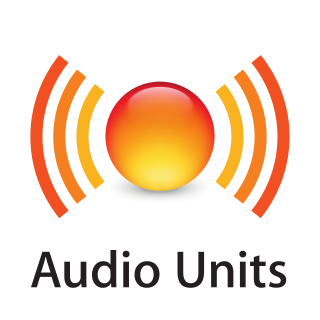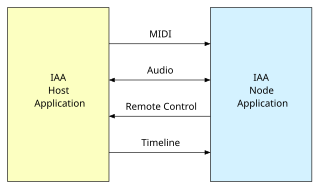 W
WAudio Random Access is an extension for audio plug-in interfaces, such as AU, VST and RTAS, allowing them to exchange a greater amount of audio information with digital audio workstation (DAW) software. It was developed in a collaboration between Celemony Software and PreSonus.
 W
WAudio Units (AU) are a system-level plug-in architecture provided by Core Audio in Apple's macOS and iOS operating systems. Audio Units are a set of application programming interface (API) services provided by the operating system to generate, process, receive, or otherwise manipulate streams of audio in near-real-time with minimal latency. It may be thought of as Apple's architectural equivalent to another popular plug-in format, Steinberg's Virtual Studio Technology (VST).
 W
WInter-App Audio (IAA) is a technology developed by Apple Inc and designed to route audio and MIDI signals between various applications within devices based on the iOS mobile operating system. The technology was first introduced in 2013 in the seventh version of iOS.
 W
WJeskola Buzz is a freeware modular software music studio environment designed to run on Microsoft Windows using MFC. It is centered on a modular plugin-based machine view and a multiple pattern sequencer tracker.
 W
WLADSPA is an acronym for Linux Audio Developer's Simple Plugin API. It is an application programming interface (API) standard for handling audio filters and audio signal processing effects, licensed under LGPL-2.1-or-later. It was originally designed for Linux through consensus on the Linux Audio Developers Mailing List, but works on a variety of other platforms. It is used in many free audio software projects and there is a wide range of LADSPA plug-ins available.
 W
WLV2 is a set of royalty-free open standards for plug-ins and matching host applications. It includes support for the synthesis and processing of digital audio and CV, events such as MIDI and OSC, and provides a free alternative to audio plug-in standards such as Virtual Studio Technology (VST) and Audio Units (AU).
 W
WMagnus Choir is a commercial, proprietary music software synthesizer, for the Microsoft Windows and macOS operating systems, written by Daniel Laiseca and developed by Syntheway Virtual Musical Instruments. The first version was released in 2005.
 W
WSynthesia is a piano keyboard trainer for Microsoft Windows, IOS, macOS, and Android which allows users to play a MIDI keyboard or use a computer keyboard in time to a MIDI file by following on-screen directions, much in the style of Keyboard Mania or Guitar Hero. Additionally, Synthesia can be paired with MIDI keyboards that have illuminated keys, or with virtual player piano on screen, which some people believe makes learning piano easier for beginners. It was originally named Piano Hero, due to the similarity of gameplay with Guitar Hero; this was until Activision sent a cease and desist to the program's creator, Nicholas Piegdon.
 W
WVirtual Studio Technology (VST) is an audio plug-in software interface that integrates software synthesizers and effects units into digital audio workstations. VST and similar technologies use digital signal processing to simulate traditional recording studio hardware in software. Thousands of plugins exist, both commercial and freeware, and many audio applications support VST under license from its creator, Steinberg.